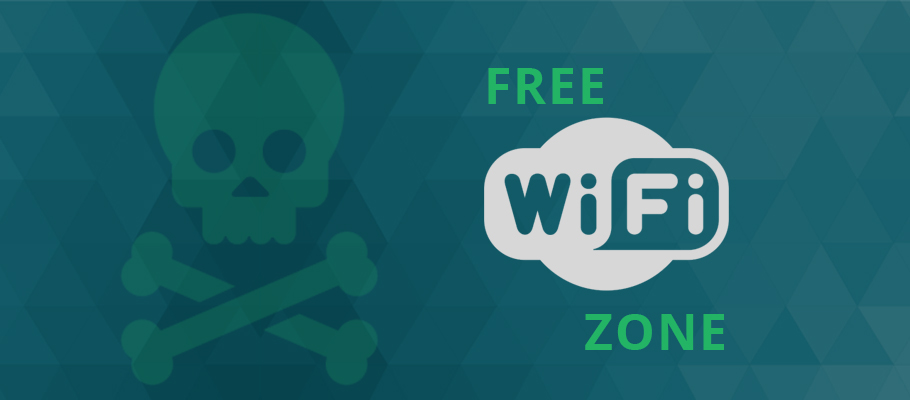Why Public Wi-Fi Is Dangerous?
People tend to use free Wi-fi generally, but are they aware about the dangers of free Wi-Fi? Most probably the answer is NO. Public Wi-Fi can be a trap to steal confidential information over the unsecured network. The network or hotspot can be a compromised machine and used for data snooping by attackers. Free Wi-Fi access seems boon for professionals as coffee shops, hotels, restaurants are the best place in current time to discuss business meetings and generally college going students also browse different sites and download stuffs at these places. However, this freedom will cost your valuable information.
What Attackers Can Do With Public Wi-Fi?
Attackers are always in search of ripe fruits and public Wi-Fi is one of them where they can easily inject malware into innocent user’s device. Hackers always hunt for login credentials related to online banking, social media emails, online shopping. They can also act as Man-in-the-middle, sniff the ongoing communication, and tamper the data. With infected software, attackers can create a pop up and urge users to upgrade the software, once a user clicks on it, the malware behind the software start downloading.
It does not mean that people should not use free Wi-Fi, The majority of hackers follow easy targets, and you should take a few precautions before accessing public Wi-Fi.
Tips To Follow When You Are Using Public Wi-Fi
-
Use a VPN
A VPN (virtual private network) is a secure network that also gives you perks of free Wi-Fi access in a secured environment. It ensures about the connection’s integrity and saves personal information. There are many VPN providers available who provides VPN at nominal price. VPN encrypts traffic between user device (computer or mobile) and the internet, even on unsecured networks. Hackers always discard encrypted data rather than to decode it. Unsecured information is their primary target.
-
SSL is always there
Regular transfer of unencrypted information over the unsecured network cause a risk to the user’s information, hence it is necessary to have SSL for websites. By enabling “Always Use HTTPS”, option on such websites will help you to secure your data. Hackers have an idea about the same password tendency that users keep for their multiple accounts which is a bad idea. Changing the password is not enough, as it requires encryption in transition.
-
Turn off Network Sharing
Turn off sharing feature in system preference or control panel (based on OS). User can disable “public” option while connecting initially to the internet. If you are using Mac then, under System Preferences option, go to Sharing, and uncheck all options.
-
Watch which sites you are browsing
Careful before entering any private information asked by a website, it may be a fake page created by attackers. Never provide login or username to any unknown sites as hackers can steal your credentials. Once they get data, they can misuse it and damage your reputation.
-
Avoid automatic connection
Many Smartphone users keep automatic connection setting in their device so once they turn on Wi-Fi, the device search for available connection and connect automatically. It can be dangerous because your device does not know which connection is secured or unsecured. At the end, a user would have to surrender its access to the hackers. For that, modify setting in your Smartphone and disable auto connect feature. If you do not see such feature in a Smartphone, then you are safe.
-
Two factor authentication
Always keep two-factor authentication for email accounts and social media accounts, it will keep you secure over the unsecured network too. Without entering code sent to your device, you cannot further access your accounts. You can rest calmly about their account safety. With two-factor authentication, if attackers try to steal a password, they will not be able to further process on your account without code that you receive in your Smartphone.
-
Identify the network name
Hackers set up a fake Wi-Fi network to lure users and gain their device access. Users should read the network name before connecting to it. If a user frequently visit any place, he should have knowledge about the free Wi-Fi name, therefore if the device found anonymous name, users should not connect to such unknown network.
-
Protect passwords
Keep your password different and do not use similar password for all of your online accounts. A password manager is an ideal option to remember of all your login and password details. A tricky password can also help you from simple password guessing. Many password managers encrypt password and login information. Even a user can share the information with friends and family person to whom a user trusts most.
-
Turn on the Firewall
Many OS comes with pre-installed firewall and observes incoming and outgoing traffic. It is true that firewall is not one and only protection, but it is advisable to turn it on (generally found in control panel > system and security tab). If any intruder wants to interfere with computer, a firewall can easily detect such intruders and will protect a computer from potential hacking.
-
Keep antivirus updated
An updated antivirus product is better rather than outdated protection software because an updated antivirus protects the PC and mobile device from installing malware, harmful software, or virus and alerts user about it. If the system tries to connect to an unsecured network, then an updated antivirus will alert you about it. It is sensible to have updated antivirus product to prevent.
Conclusion:
From the above discussion, it is clear that free Wi-Fi is a boon as well risk to a user’s security. Therefore, understanding public Wi-Fi risk can prevent you from being victimized. Mostly when you travel a lot and have to take shelter of such Wi-Fi hotspot, you need to take precautions.

